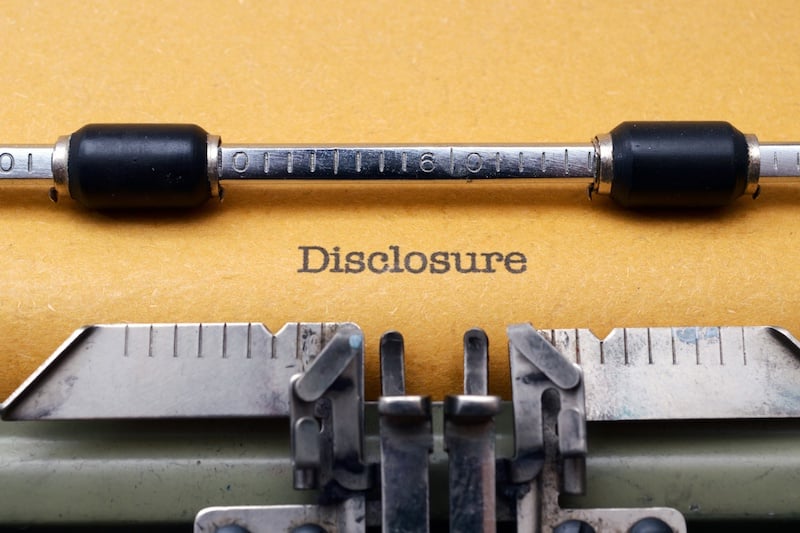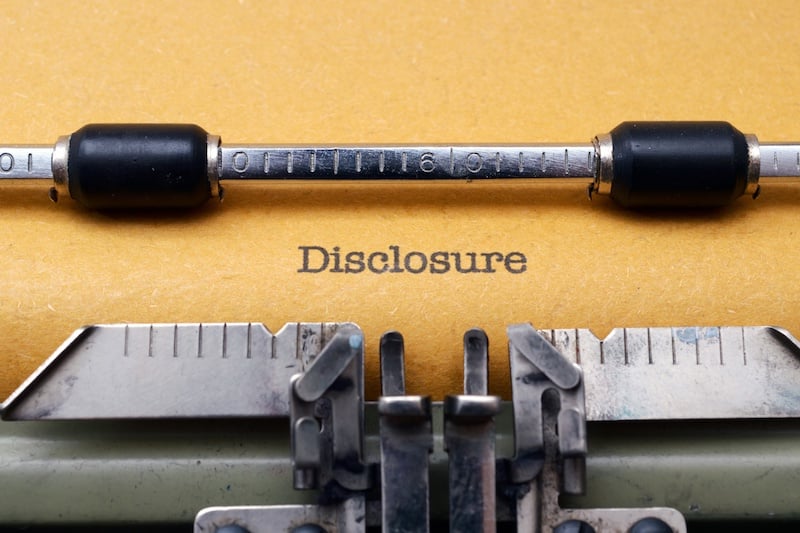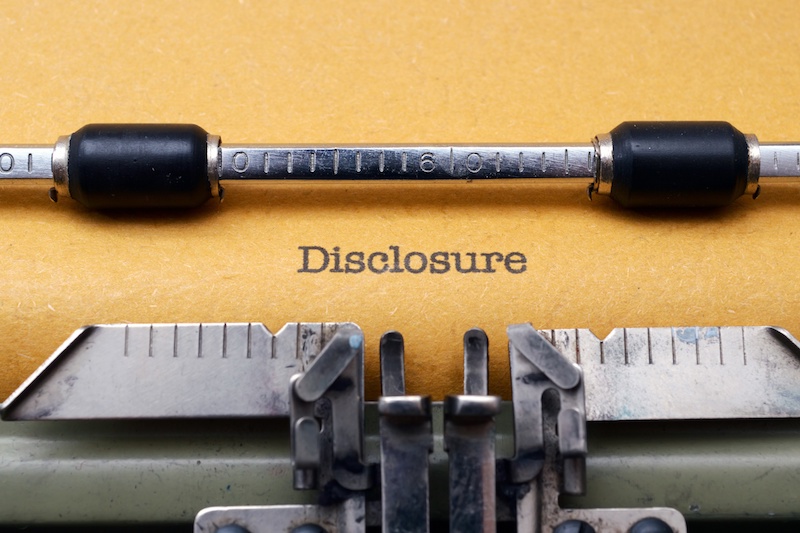
19 Things You’ll Need to Note on a Maryland Home Disclosure Form
Posted on Apr 09, 2021
Maryland home sellers are required to disclose the condition of their home. This means that they...

Posted on Apr 09, 2021
In New Jersey, home sellers have a legal obligation to buyers to disclose information about their property’s known defects. Failure to disclose can result in costly legal skirmishes that most homeowners would rather avoid.
Every state has unique requirements for disclosure law, and New Jersey’s disclosure form is different from nearby Pennsylvania, Delaware, and New York’s.
You may be wondering: do I need to disclose that problem we had with the roof, even though it was fixed? What about the tiny cracks in the foundation? Would it benefit me to pretend like I hadn't seen it?
Knowing the answer to these questions is important for ensuring your home sale goes smoothly. If you’re preparing your house for sale in NJ, here’s what you need to know about disclosure.
In New Jersey, home sellers are not required to fill out a disclosure form - though it is often recommended in order to ensure that sellers meet the state’s disclosure obligations, which are required.
As part of your seller obligations:
If you put your home on the market, under New Jersey law this means you’re implying it’s fit to live in. If the buyer finds out that the home was built in a way that isn’t up to code, the stairway banister is missing, or none of the toilets work, then you could be held liable.
This is what the NJ seller disclosure form covers. For example: if you know the roof leaks in winter, and you sell the home in summer when the leak isn’t obvious, you need to include this information in the disclosure.
Real estate representations are essentially a statement of facts relating to the property. An example of representations for a home include that you have the right to sell your home, your home is what you say it is (as defined by disclosure, etc), and any relevant warranties (such as compliance with local laws).
“Intangible” covers paranormal activity and deaths. While you don’t need to include this info, you must give it if the seller inquires.
In New Jersey, sellers can fill out a document known as the “Standard Form of Seller’s Property Condition Disclosure Statement” - but they are not required to. Your listing agent should be able to provide you with the most up-to-date version, and can help you fill it out accurately.
“You have an obligation to disclose anything you know,” advises New Jersey listing agent Ruben Concepcion. “The point of the disclosure form is to make it uniform - to make it easy for everyone to fulfill that obligation, so that it’s signed and you know you’ve done what you’re supposed to.”
Ultimately, notes Concepcion, filling out the form is in the seller’s best interest: it limits their liability later on.
“It’s an easy way to do it; why put it up for misinterpretation? That form covers just about everything. The great thing about the disclosure form is that not only does the seller have to sign it before listing, but the buyer has to sign it during the signing of the contract. By signing they're saying, 'I have now reviewed and accept what you put down.' If the buyers ask for something after inspection that was already disclosed on the form, then it's easy for us to point back to that - they already signed off on it.
That’s the nice thing about the disclosure - it gives us a little bit of leverage."
Some homeowners may be dealing with a rental, flipped, or inherited property, in which case it can be difficult to fully disclose problems; if your uncle was living in the house and noticed a roof leak but never mentioned it to you, are you still responsible for disclosing it?
The disclosure document only requires you to list known issues - which means issues can exist, unbeknownst to the seller. If you want to cover your bases in this type of situation, make sure the buyer does not waive the inspection. That way the buyer will be informed of any major defects, even if they were truly unknown to you. You can also add an “As Is” addendum document to the sale. While this doesn’t relieve you from your obligation to disclose, it will serve as a warning to the buyer that there may be latent or hidden defects to which you are not aware.
“If you don’t know the answer, that’s an acceptable answer because the point is to just tell what you know about the property. So don’t go nuts trying to find the answer,” explains Concepcion. “But then if there’s something else that you know is a defect that isn’t listed in the NJ disclosure document, you do need to indicate that somewhere.”
If you sell a property “as is” in New Jersey, some sellers interpret this to mean the buyer purchases the house with no inspection. This is not the case, though: the buyer can still cancel the sale or request repairs if major issues are revealed during an inspection. The “as is” addendum is more a statement of buyer intent (to not negotiate repairs) than it is a binding agreement, as per sellers disclosure NJ laws.
Home inspections are highly recommended to protect both the buyer and the seller in a property transaction. If the buyer’s home inspection reveals defects with the home, they will have a few options available to them as outlined by the sale contract. Standard New Jersey home sale contracts typically say that if it’s a major defect (like foundation issues), they will be able to cancel the sale.
However, it is extremely common for issues to come up during the home inspection - this is even true for new homes. If it’s a more common issue (like a broken dishwasher), the seller can agree to have it repaired, replaced, or offer a discount on the price of the home. The details of what the seller and buyer agree to are typically discussed in negotiations between their two agents.
The current NJ disclosure form covers 107 points in 16 categories, and you should ask your Realtor for the most up-to-date edition. Each of the sections must be marked yes, no, or unknown where applicable. Here is a section-by-section breakdown of what to expect.
Occupancy
In this section you’ll need to note whether you, the seller, currently occupy the property, the year you bought it, and the age of the home. You will need to attach a deed (or deed copy) evidencing ownership if you have it.
Roof
In this section you’ll need to record the age of the roof, any repairs or replacements to the roof that have occurred, and you’ll need to document any leaks that you’re aware of.
Attics, Basements, Crawl Spaces
In this section you’ll need to note the condition of your attic, basement, and/or crawl space. Anything like water accumulation, mold presence, or sump pump issues will need to be documented here, along with relevant repairs. Whether you access the attic by ladder, staircase or another way, you’ll need to note that here.
Wood Destroying Insects
If you’ve had issues with termites you’ll need to note it here - even if they’ve been successfully treated by a pest control company.
Structural Items
This section addresses potential issues with the foundation (shifting, moving, etc) as well as the construction of the home itself. If fire retardant plywood was used in construction, for example, you’ll need to note that here. The document also asks about problems with driveways, patios, retaining walls, and more.
Additions/Remodels
It’s important that homeowners obtain proper building permits and approvals for additions and remodels. You’ll need to note any changes to the property structure made either by you or past owners in this section.
Plumbing/Sewage
This section covers 14 points relating to the home’s plumbing and sewage, such as what the source of your drinking water is, what type of sewage system you use, and whether you have a water heater.
Heating and Air Conditioning
In this section you’ll need to indicate what sort of air conditioning you have (or note if there’s none) as well as how you receive your heat. You’ll also need to note the age of your furnace/heating system and any issues that have popped up with your HVAC.
Wood Burning Stove or Fireplace
If your home has a stove or fireplace you’ll need to note it here, as well as its cleaning schedule and any issues you’ve had.
Electrical System
Does your home use aluminum, copper, or something else for its wiring structure? You’ll need to note that here, as well as the amp service it has and whether you have circuit breakers, fuses or both.
Land (Soils, Drainage, and Boundaries)
If your property is located in a flood zone or includes protected wetlands, you’ll need to note that here. This section also covers boundary line disputes, shared common areas, and expansive soil.
Environmental Hazards
The environmental hazards section covers anything that can impact the quality of the soil, water, physical structures, and/or air around your property. The presence of lead paint will need to be recorded here, as well as the presence of any underground storage tanks.
Deed Restrictions, Special Designations, Homeowners Associations/Condominiums
This section deals with deed restrictions, like HOAs. You’ll need to include the exact details of whatever restrictions your property is subject to, including the dues you owe, by-laws that can impact the property, and more.
Miscellaneous
As you can imagine from its title, this section covers a lot of ground. You’ll need to note down any violations of local, state, or federal laws relating to the property; you’ll need to note zoning violations; and you’ll need to note liens or defects in the property title that could impact selling the home.
Radon Gas
Under New Jersey law, property owners who have tested their property for radon gas can keep the results confidential until both they and the buyer have entered into a contract of sale. You can waive the confidentiality for the disclosure, or you can opt to disclose whether you’ve tested and treated the property for radon gas.
Major Appliances and Other Items
In this section you need to list all the appliances in or around your home, as well as their condition. This includes everything from smoke detectors to in-ground pools, as well as the typical dishwasher, refrigerator, dryer, etc. You should be explicit here about which items are and are not included in the sale of the home.
20 Problems You’ll Need to Note in a PA Seller’s Disclosure
Best Places to Live in NJ: 4 Neighborhoods for First Time Homeowners
Subscribe to our newsletter to get essential real estate insights.

Posted on Apr 09, 2021
Maryland home sellers are required to disclose the condition of their home. This means that they...

Posted on Apr 09, 2021
Is Delaware a disclosure state? Yes; in Delaware, home sellers are required by law to disclose the...

Posted on Apr 09, 2021
For first time home sellers, the seller’s disclosure statement can be confusing. What do you have...